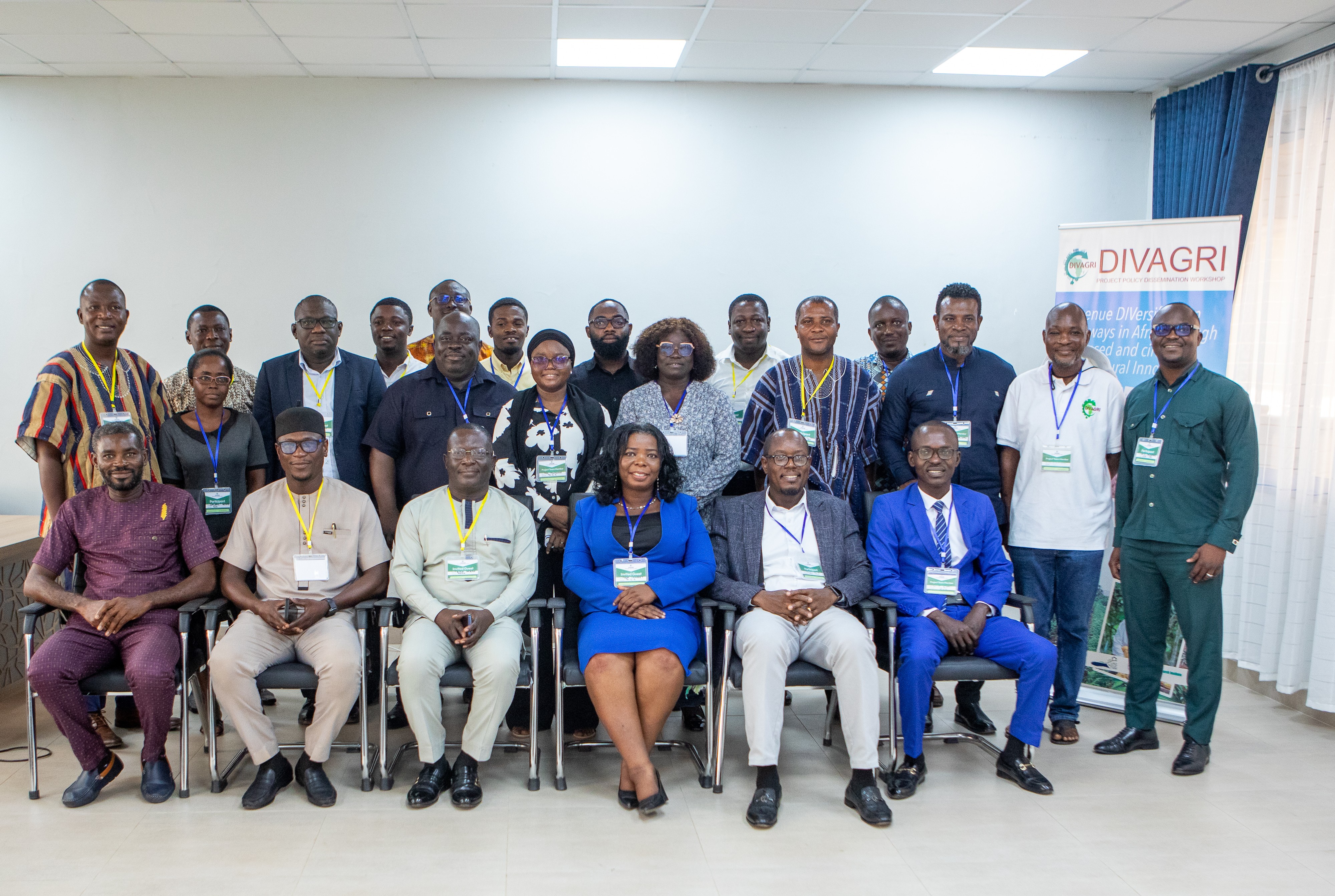The government has been urged to support local innovations, including the manufacturing of rudimentary farm technologies to help address the country’s dependence on imported technologies and agricultural machinery.
Many believe that Ghana has the requisite human resources and technical know-how to produce agricultural tools, innovations, and machinery to consolidate gains in the sector when given the necessary backing.
The Ghana Lead of the Revenue diversification pathways in Africa through bio-based and circular agricultural Innovations (DIVAGRI) Project, Dr. Francis Kumi, who made the call, implored researchers and policymakers to deepen collaboration to ensure that local innovations translate into national development.
He was speaking at a policy dissemination workshop held at the Science Annex Conference Room of the University of Cape Coast.
Some participants in the workshop
It was attended by a coalition of voices from civil society, including researchers, policymakers, students, and media practitioners to brainstorm ways to boost innovation and sustainability in Ghana’s agricultural sector.
Continuing, he said the time was ripe for the country to “build its own technologies, not just borrow or depend on those developed by others”, adding that developing locally made farming tools and equipment could help create jobs, empower rural communities, and strengthen agricultural productivity.
Dr. Kumi said local machinists and artisans were adequately equipped with the skills to design tools that meet the requirements of smallholder farmers. With the needed push in terms of proper allocation of resources for continuous professional development and retooling of workshops with modern facilities, they should be able to meet expectations.
“When we invest in our innovators, we keep value within our economy. The challenge is not a lack of talent, but a lack of trust in our own systems,” he said.
Dr. Francis Kumi
He challenged institutions such as UCC and the Council for Scientific and Industrial Research (CSIR) to continue building partnerships with farmers and industry players, adding that innovation should be linked to policy and practice.
Dr. Kumi highlighted that the government spends a lot of money to import farm machinery, to the disadvantage of smallholder farmers who lack the purchasing power to acquire them.
He stated that the panacea was for the government to support local machinists and innovators to design affordable machinery like planters, weeders, fertilizer applicators, and threshers that meet the needs of small-scale farmers.
“If the government supports our local machinists, farmers will no longer struggle to buy the equipment they need. We can even produce machines that extract oil from plants such as moringa right here in Ghana,” he stated.
He announced that during their research engagements, hundreds of farmers vent their utter frustration about the rising cost of imported machinery, indicating that homegrown manufactured machines would be affordable and more accessible.
Dr. Kumi also urged Ghanaians to see agriculture beyond food production, insisting that agriculture and tourism could be blended to create new income opportunities.
“A farmer could run a farm as both a workplace and a tourist destination, where visitors can learn about agriculture, relax, or even conduct research. This would attract tourists and promote agri-tourism in Ghana,” he added.
A Farming Systems Specialist at CSIR, Dr. Eric Owusu-Danquah, presented findings from their study on intercropping and desalination greenhouse technology.
According to him, intercropping maize with pigeon pea boosts soil fertility and productivity while cutting down fertilizer use.
“Instead of using two bags of fertilizer, farmers can use one and still harvest the same yield,” he noted, calling for stronger policy support to scale up such practices.
For his part, a Deputy Director of DRIC-UCC, Dr. Bervell Brandford, lauded DIVAGRI for promoting practical research and innovation that directly benefit farmers and students.
He said the project had empowered many participants through the University’s Directorate of Research, Innovation and Consultancy (DRIC) and urged continued support for such initiatives.
Dr. Peter Omega
In a speech read on behalf of the Minister of Food and Agriculture, by the Central Regional Director for Food and Agriculture, Dr. Peter Omega, hailed the UCC team and its partners for their leadership in promoting circular agricultural innovations through the DIVAGRI Project.
"The initiative aligns with the government's “Feed Ghana Programme” (2025–2028), which seeks to increase productivity, strengthen food security, create jobs, and enhance value addition across the agricultural sector, " he added.
He underscored that the circular bioeconomy approach promoted by DIVAGRI was vital for achieving national agricultural goals, as it converted waste into value and ensured sustainable production.
“Ghana spends over two billion dollars annually on food imports. If we embrace circular agricultural innovations, we can feed ourselves, process what we grow, and even export quality produce,” he said.
In addition, Mr Faiza Mukaila, representative form the Ministry of Food and Agriculture in Accra, urged researchers to involve people working directly on the fields whenever such studies were being conducted.
Mr Faiza Mukaila
He explained that farmers and field practitioners possessed valuable hands-on knowledge that often escapes academic research, and their inclusion could help close the gap between theory and practice.
“Those of us on the field know the realities, the challenges, and even the simple techniques that can make farming more efficient. If researchers include our voices, the solutions will be more practical and sustainable,” he said.
DIVAGRI project is a consortium project that aims to increase the productivity, income and economic opportunities of subsistence and small holder farmers by implementing innovative bio-based solutions that would improve agricultural production, enable diversification of crops and increase value addition, create environmental, social, and economic sustainability, and generate new local economic opportunities.
The project has received funding from the European Union Horizon 2020 Programme under grant agreement to provide farmers with tools to sustainably improve farm productivity, profitability, and resilience through improved management of farming resources, output diversification and creation of high-value circular bioproducts.





